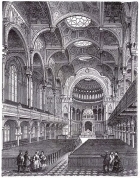Significance
Equipping students to make well-reasoned judgements about the historical significance of past events is one way of alerting them to the value and purpose of studying the past. But teaching about this disciplinary concept also involves developing young people’s understanding that historical significance is not an enduring or unchanging characteristic of any particular event. It is a contingent quality that depends on the perspective from which that event is subsequently viewed. While judgements of significance are likely to include consideration of the depth and extent of any immediate consequences arising from the event in question, they will also be based on the endurance of those consequences as well as on subsequent developments and on the concerns of those who are making the judgement. The resources in this section explore the range of criteria that students might be encouraged to use in ascribing significance to events and set out a variety of productive strategies that teachers have used to help students work with others’ criteria as well as formulating, justifying and deploying their own.
-

Berlin and the Holocaust: a sense of place?
ArticleClick to view -

Using 1980s popular music to explore historical significance
ArticleClick to view -

Nutshell
ArticleClick to view -

Creating controversy in the classroom: making progress with historical significance
ArticleClick to view -

What they think they know: the impact of pupils' preconceptions on their understanding of historical significance
ArticleClick to view -

Maybe they haven't decided yet what is right: English and Spanish perspectives on teaching historical significance
ArticleClick to view -

Looking through a Josephine-Butler shaped window: focusing pupils' thinking on historical significance
ArticleClick to view -

Seeing, hearing and doing the Renaissance (Part 1): Let's have a Renaissance party!
ArticleClick to view -

Historical significance - the forgotten 'Key Element'?
ArticleClick to view

